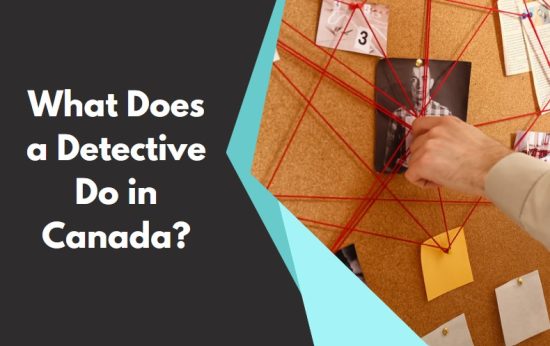Are you fascinated by crime scenes and solving mysteries? Do you have what it takes to be the next Sherlock Holmes or Nancy Drew? If yes, then a career as a detective in Canada might just be your calling. Detectives are responsible for investigating crimes, gathering evidence, interviewing witnesses, and ultimately bringing criminals to justice. But how do you become a detective in Canada? In this article, we will provide you with all the information you need on education requirements, training programs, essential skills, work environments and much more on how to become a detective in Canada! So put on your thinking caps and let’s dive into the exciting world of detectives in Canada.
What Does a Detective Do in Canada?

Detectives are law enforcement officers who handle criminal investigations and collect evidence to solve crimes. In Canada, detectives work in a variety of sectors including local police departments, federal agencies like the RCMP (Royal Canadian Mounted Police), private investigation firms, or even as self-employed consultants.
Their responsibilities include investigating crime scenes, interviewing witnesses and suspects, analyzing evidence such as fingerprints or DNA samples- often with the help of forensic experts-, compiling reports on their findings and presenting them in court proceedings if necessary.
Detectives may also perform surveillance operations to gather additional information about suspects or conduct undercover operations to infiltrate criminal organizations. They collaborate closely with other law enforcement professionals such as police officers, lawyers, judges and social workers to ensure that justice is served for victims of crime.
A detective’s job can be demanding both physically and mentally. The work requires long hours of standing at crime scenes collecting evidence or sitting behind a desk going through legal documents. It can also expose them to dangers like violent offenders who may harm them during an arrest.
Despite these challenges, being a detective in Canada can be an exciting career path full of opportunities for personal growth and professional development.
The Different Types of Detectives in Canada
In Canada, there are several types of detectives who perform different roles in law enforcement.
- One of the most common types is the police detective or investigative officer, who works within a particular department to investigate crimes and gather evidence.
- Another type of detective in Canada is the private investigator. Private investigators work for individuals or businesses to conduct investigations into matters such as fraud, theft, and infidelity. They may also provide security services for events or high-profile individuals.
- There are also specialized detectives in Canada, such as forensic investigators who use scientific methods to analyze evidence found at crime scenes. Other examples include arson investigators who specialize in investigating fires and explosives incidents.
- Furthermore, specific federal agencies have their own specialized detectives that focus on combating organized crime and smuggling activities across borders.
Whether working for government agencies or private companies, Canadian detectives play an essential role in maintaining law and order while keeping communities safe from criminal activities.
How to Become a Detective in Canada?
Becoming a detective in Canada can be an exciting and challenging career choice. Detectives play a crucial role in investigating crimes, solving cases, and bringing justice to victims. If you’re interested in pursuing this career path, there are certain steps you need to take.
- Firstly, you’ll need to have the right education and training. A high school diploma is typically required for entry-level positions in law enforcement, but most agencies prefer candidates with at least a bachelor’s degree from an accredited university.
- You may also need to complete additional training through police academies or specialized programs that focus on investigative techniques and crime scene analysis. This will help you develop the necessary skills needed to become a successful detective.
- In addition to education and training, it’s important to possess certain qualities such as strong communication skills, attention to detail, critical thinking ability, and problem-solving skills. These attributes will enable you to effectively gather evidence and analyze data during investigations.
- Another critical aspect of becoming a detective is gaining experience working as a police officer or in other related fields such as corrections or private investigation firms. This experience can provide valuable insight into criminal behaviour patterns which could aid your future work as a detective.
Becoming a Detective in Canada requires dedication towards learning the necessary skills & obtaining relevant qualifications while building up real-world experience within various sectors before advancing onto higher roles within law enforcement agencies across Canada.
The Education and Training Required to Become a Detective in Canada

- Becoming a detective in Canada requires significant education and training. Although there is no specific degree requirement to become a detective, most employers prefer applicants with a bachelor’s degree in criminal justice or related fields. Some detectives even have law degrees.
- In addition to formal education, aspiring detectives must also undergo specialized training through police academies or other law enforcement agencies. This training includes classroom instruction on investigative techniques such as evidence collection and analysis, surveillance methods, and crime scene processing.
- Furthermore, candidates must pass stringent physical fitness tests and meet strict background check requirements before being considered for the position of detective. They must also possess strong interpersonal skills and critical thinking abilities essential to identifying patterns of behaviour that may indicate criminal activity.
- Once hired as detectives, individuals typically receive ongoing training throughout their careers to keep up with new technologies and trends in the field of criminal investigation.
- Becoming a successful detective requires both academic achievement and practical experience gained from intensive training programs designed specifically for this profession.
The Skills Needed to Be a Successful Detective in Canada
Being a detective in Canada requires a unique set of skills that are essential to the job.
- First and foremost, detectives need excellent communication skills to effectively gather information from witnesses, victims, and suspects. They must also be skilled at active listening to pick up on small details that could help solve a case.
- Critical thinking is another crucial skill for detectives in Canada. They need to be able to analyze complex pieces of evidence and use deductive reasoning to piece together different elements of a case. This means they need exceptional problem-solving abilities.
- Other important skills include attention to detail, organization, and time management. Detectives must keep meticulous records of their investigations while juggling multiple cases at once. Being able to stay focused under pressure is also important since many cases involve high levels of stress.
- Having empathy and cultural awareness are valuable traits for detectives working in diverse communities across Canada. These qualities can help build trust with community members who may not have faith in law enforcement due to past experiences or systemic issues.
Being a successful detective in Canada requires a combination of technical expertise and interpersonal skills that allow them to navigate complex investigations while building relationships with those around them.
The Work Environment of Detectives in Canada
Detectives in Canada work in a variety of environments, ranging from police departments to private investigation firms. They could also find themselves working for government agencies or becoming self-employed as consultants.
- In the police department, detectives work closely with other law enforcement officers and support staff. They may be required to spend extended periods of time conducting surveillance, gathering evidence, or interviewing suspects or witnesses.
- Private investigators tend to have more flexibility with their schedules and can choose which cases they want to take on. As such, they may spend significant amounts of time travelling between different locations or conducting research online.
- Regardless of where they work, it’s important for detectives to maintain a professional demeanour at all times since the nature of their job often requires them to interact with people who are going through difficult situations.
- Detectives need to be prepared for long hours and unpredictable schedules since criminal investigations don’t always follow regular business hours. However, the satisfaction that comes from helping bring criminals to justice can make this career truly rewarding.
The Benefits and Drawbacks of Being a Detective in Canada

Being a detective in Canada comes with both benefits and drawbacks.
- One of the biggest advantages is the satisfaction you get from solving complex cases and bringing justice to victims. It can be incredibly rewarding to know that your work has made a difference in someone’s life.
- Another benefit is job security. With crime rates increasing, there will always be a demand for detectives, making it a stable career choice. Additionally, being a detective provides opportunities for growth and advancement within law enforcement agencies.
- However, being a detective can also come with its challenges and drawbacks. For one, it can be emotionally draining to deal with cases involving violence or tragedy. The job requires extensive hours of investigating which means less time spent with family and friends.
- Moreover, being exposed to dangerous situations is an inherent risk that comes along with this profession; thus putting yourself at risk every day due to potential threats on the job becomes unavoidable.
- Becoming eligible for promotion may require additional training or education beyond what was initially required – which could result in taking up more courses while working full-time as well as not having enough time off due to this reason alone.
- Deciding whether or not becoming a detective is right for you depends largely on personal values such as interest in criminal justice work versus balancing family life demands alongside fulfilling professional goals over time- but if you’re passionate about helping people solve crimes then it might just be perfect!
Conclusion
Becoming a detective in Canada is an exciting and challenging career path for individuals who are passionate about solving crimes, uncovering evidence, and bringing justice to victims. It requires dedication and hard work to acquire the necessary skills, education, and training needed for this profession
To become a successful detective in Canada, you must possess strong analytical skills, attention to detail, critical thinking abilities as well as excellent communication and interpersonal skills. You must also be physically fit with good mental health since the job can be stressful.
The process of becoming a detective can take several years of education followed by practical experience on the job. However, persistence and determination combined with a passion for law enforcement work make it all worth it.
FAQs on how to become a detective Canada
1. How much money does a detective make in Canada?
In Canada, a Police Detective makes an average salary of $89,871 per year and $43 per hour. Police detectives may expect to make between $62,820 and $109,284 per year on average. Police Detective often has a High School Diploma as their highest degree of schooling.
2. Which stream is best for a detective?
A criminology and forensic science course is recommended for anyone interested in becoming a detective as it will help them hone their skills.
3. What do you need to become a detective in Canada?
It’s necessary to complete a three- to six-month police training course. There are standards for physical agility, strength, fitness, and vision, as well as psychological or other exams. For some policing positions, specialized training or certification may be necessary.
4. How long does it take to become a detective in Canada?
Depending on education and experience, being a criminal investigator normally takes 2 to 6 years.










